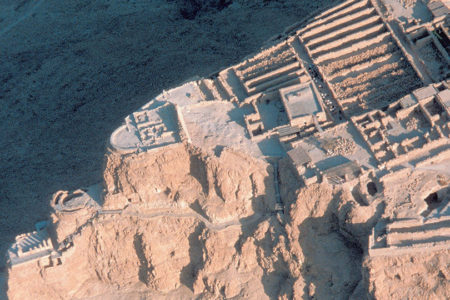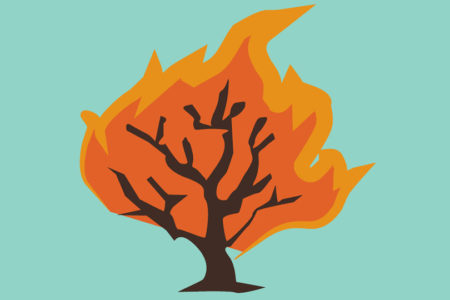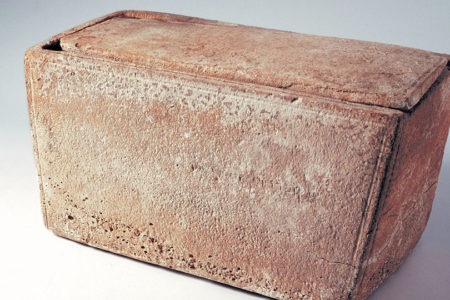Zvi Jul/Aug 2003
The ninth day of the month of Av is drawing near (August 7). So the people of Israel come to the Western (Wailing) Wall, weeping night and day and reading the book of Lamentations, asking God why He has forsaken them.
They ask, “Why dost thou forget us forever, and forsake us for so long a time? Turn thou us unto thee, O LORD, and we shall be turned; renew our days as of old” (Lam. 5:20–21).
The ninth of Av is a serious fast day on the Jewish calendar. It is a day of mourning because so many tragedies in Jewish history occurred on that day. But the biggest tragedies associated with the ninth of Av are the destructions of the two Temples in Jerusalem. Both were burned on that date, 656 years apart.
All that is left today of the Second Temple is a retaining wall known as the Western Wall. Once a year, people flock here to mourn the destructions and lament the trouble that has come on the Jewish people over the centuries. Then they leave, and all is forgotten.
I often walk among them near the Wall and hear with what deep feeling they pray. After a few people finished praying recently, I asked them, “Why are you so sure the Lord has forsaken you?”
One of them asked me, “Who are you that you ask us such a question? And why did you ask us?”
“I asked,” I said, “because I know the Lord never forsakes us. We are the ones who forsake Him and abandon His commandments. It is clearly written in Isaiah 1:2, ‘I have nourished and brought up children, and they have rebelled against me.’ The Lord never forsakes us if we come to him with a sincere heart. There is mighty power in prayer.”
They looked at me carefully, examining how I dress because I do not wear the clothing of the Orthodox. “Look who speaks to us about faith! Why do you even come here? Are you so faithful?” someone asked with a sneer.
“I do not come as you do, wearing special clothes and praying in a way to make people look at me so that they will think I am so faithful.” I told them it is my obligation before the Lord to go to people and tell them the truth. God tells me to do so in the Bible. Then they became more interested and began to gather around me. They wanted to know to which sect I belong.
“I do not belong to any sect,” I said. “And I do not use all the many books you have here. You have so many books but not one Bible. Those many books were written by many different people. But all those books together do not have the value of one page of the Bible because the Bible was written by the Holy Spirit of God. It is written in Proverbs 19:21, ‘There are many devices in a man’s heart; nevertheless, the counsel of the LORD, that shall stand.’ Man proposes, but God disposes.”
They listened with great attentiveness. Then someone asked, “How do you know all this? Why shall we believe what you say?”
This time I read to them from Psalm 118:8: “It is better to trust in the LORD than to put confidence in man.” I tried to show them that I am not like them, spending my life reading commentaries and books written by men. “I believe in the Lord,” I said, “only according to what is written here in the Bible. This is the most important book written. How shall you follow the commands of the Lord if you do not know the full truth written here?”
I began to show them more verses, and they were interested in reading them. I told them, “Mashiach Tzidkenu [“Messiah our Righteousness”], He is Yeshua [“Salvation”]. Yeshuais also the Hebrew name for Jesus. Only in the Hebrew language does this phrase work in this manner and is considered “kosher.” In such language I spoke to them and read more and more of the Bible to them. Then I read to them from Isaiah 53.
Then they understood quickly about whom I spoke. “You believe in this Man,” they said, meaning Jesus. But they could not be against me because I showed everything to them from the Bible. Yet it bothered them that all I had was one little book.
“From which books do you pray?” one asked.
“My prayer book is my heart. I come before the Lord and open my heart before Him. And I use no books. I read from the Bible.”
They asked me many questions and wanted to know who my rabbi is. I told them again that all I do is read the Bible and believe what is written there. “And the Lord encourages me. And so I never feel that He has forsaken me. That is why I can come with such confidence to people like you to teach you the truth.”
Some of them began to write down what I said. “We will ask our great rabbis. They will have an answer for us,” they told me. Then one asked me to come by again so that we could continue our conversation.
“I am always at your disposal,” I said.







